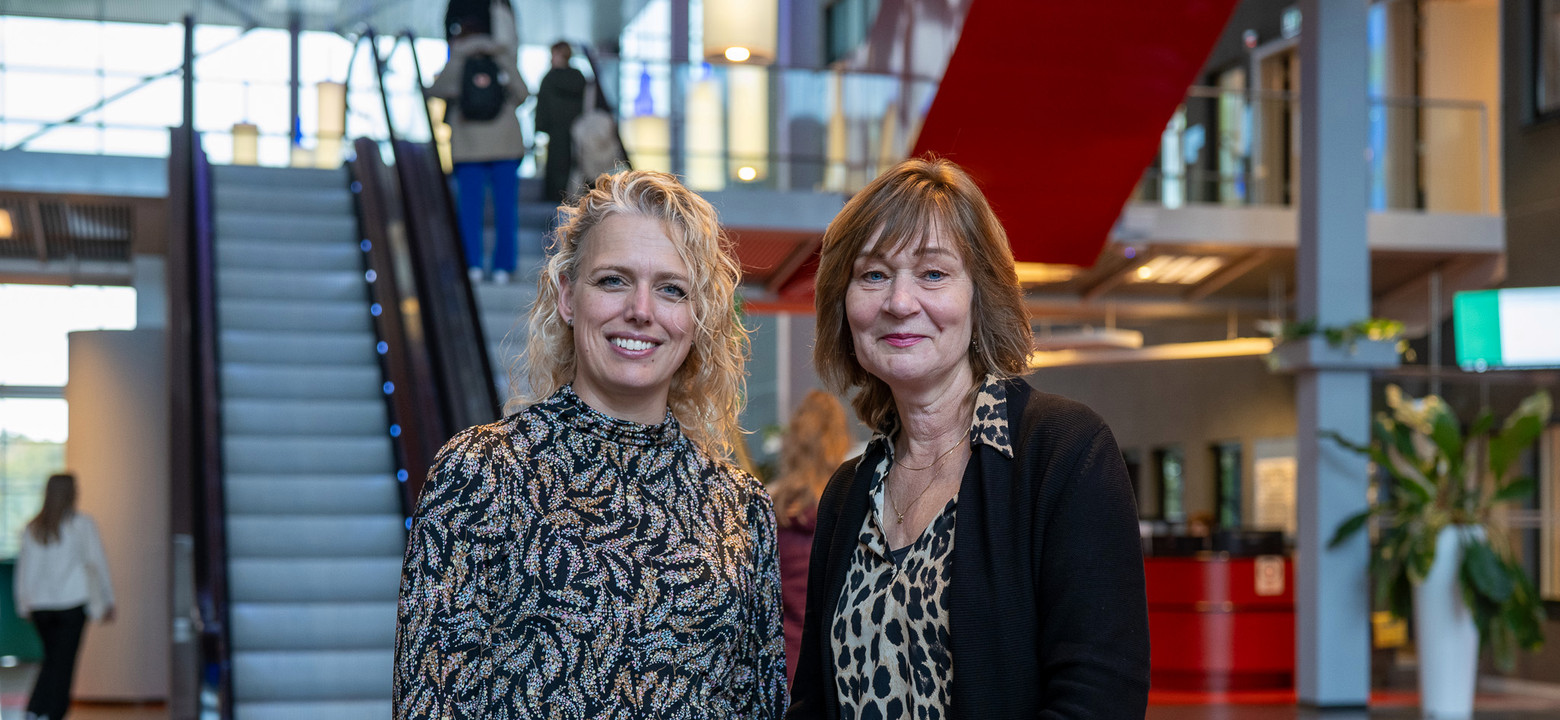Orange the World: Saxion turns orange for a world without violence against women
This year Saxion is once again supporting the message of Orange the World: the campaign to raise awareness of the universal problem of violence against women and girls. From Saturday, 25 November until Friday, 1 December the Epy Drost building in Enschede and the central hall of the main building in Deventer will be coloured orange. Additionally, Saxion is organising a variety of events for students and staff, and there are posters and bookmarks in the buildings with more information about Orange the World.
Orange is the colour of the sunrise. The colour of hope. In the Orange the World campaign it specifically symbolises the hope that one day we will live in a world without violence against women and girls. The campaign starts on 25 November: the International Day for the Elimination of Violence against Women and Girls, and runs to 10 December, International Human Rights Day. The theme this year is ‘Safe, everywhere and always’. Campaign organisers want to use this to raise more awareness to the fact that violence against women and other inappropriate behaviour, is a relevant issue that takes place everywhere. Not only behind closed doors and on the street, as is often thought, but everywhere.
45 per cent
Anouk Bezoen and Heleen Hattink, appointed as personal safety directors at Saxion, are pleased that Saxion is supporting the campaign again this year. Anouk cites the results of an extensive European study to give an indication of the scale of the problem of violence against women. “45 per cent of all women have experienced physical and/or sexual violence at some point in their life. In the case of one in ten this involves rape. Five of every ten women have been physically abused at some point by a partner or ex-partner.
With roughly 30,000 students and 3,000 staff, every student or staff member knows a women who has been a victim of violence at some point in her life. Heleen: “I often compare Saxion to a village. Just like in a village, these kinds of major social issues also take place here. It is important that we are aware of this and pay continuous attention to the question of which behaviour is appropriate and inappropriate.

Anouk Bezoen (left) is also a Saxion lecturer. Among other things she teaches students at the Social Work study programme on subjects including domestic violence, sexuality and intimacy and dealing with aggression. She is a trained social education worker and has worked in child and adolescent psychiatry and youth care. Heleen Hattink (right) works as project leader at Saxion Part-time School and has a background in hospitality and business management studies and is also a trained mediator and confidential intermediary. Heleen: “The nice thing about our collaboration is that I look at the theme of personal safety more at organisation level while Anouk looks more from her substantive expertise. We complement each other very well.” Photography: Thomas Busschers
Reverse approach
Raising awareness of violence against women, and of inappropriate behaviour in a broader sense, is in keeping with Anouk and Heleen’s mission as personal safety directors: ensuring that the problem of inappropriate behaviour is better addressed at Saxion. “We refer to our working method as ‘the reverse approach’,” says Heleen. “Ideally, you want to immediately tackle the culture that encourages inappropriate behaviour or that leads to it not being openly discussed, but as organisation you need to have the right set up to do this. We have therefore chosen to initially focus on the existing structure that exists to help make inappropriate behaviour open to discussion. To make it easier to find, more accessible and more transparent. If you come forward with an incident that is very painful for you, then the experience of reporting it should at least be a positive one.”
“We’ve had conversations with everyone who has an influence on personal safety at Saxion,” says Anouk about the first part of their reverse approach. “Anyone who might be involved in any kind of way with inappropriate behaviour. Together we looked at what information students and staff need to be able to challenge this kind of behaviour.” The result of these efforts can be seen in an improved overview page Personal safety, where students and staff can find all relevant information in relation to inappropriate behaviour. Heleen: “In both the Student Charter and the Code of Conduct for employees, we have described more clearly what we mean by appropriate and inappropriate behaviour. There has also been an infographic developed. People who have experienced inappropriate behaviour, or are unsure about it, can see the steps that they can take.”
If you come forward with an incident that is very painful for you, then the experience of reporting it should at least be a positive one.
A good conversation
Anouk and Heleen regard the frameworks for how we treat each other at Saxion, and the clear ‘paths’ people can take who want to raise the matter of inappropriate behaviour, as the basis for further awareness and professionalisation in this area. Heleen: “The next step is to support study coaches and supervisors, for example in the form of training, in order to help them have good conversations with students and staff about what appropriate behaviour entails.”
Having a good conversation about inappropriate behaviour is important, according to Heleen, when it comes to what she calls the “grey area”: situations where it is not entirely clear where the line lies. Heleen: “So I’m not talking about violence or sexual violence, but about behaviour that someone experiences as inappropriate, without it necessarily crossing the line that we have set together. Where a person’s personal boundary lies depends on the situation, a person’s previous experiences, upbringing and/or culture background.”
Anouk also believes in the power of a good conversation: “When people have a genuine dialogue, they often discover that they have more similarities than they thought. Everyone enters a conversation with their own ideas, wishes, beliefs and needs.” To clarify what she means by this, Anouk uses a metaphor: “If you describe the Ko Wierenga building from Parkstraat, and the other person does the same from Climate Square, then you both describe something completely different. Yet you're both talking about the same building. The question is: do you want to walk around to look at the building from the other side and discover that you are essentially describing the same thing?”
An integrated approach to inclusion, diversity, equality and accessibility. The best thing would be for those who are designated with this task to be already involved in education, a service, an association or another part of the organisation.
Role of the Confidential Intermediary
In this further professionalisation, Anouk and Heleen also see an important role for confidential intermediaries at Saxion. “They are not only good at assisting those reporting something,” Anouk believes, “they are also trained to provide information about inappropriate conduct. And to give managers and directors solicited and unsolicited advice. It would be good if they could be given more room for this. Then they can also make a very valuable contribution in the field of prevention. By identifying trends, for example. Every location, department and team may have to deal with different issues. There is no one size fits all solution for inappropriate behaviour.”
Broader foundation
Although clear frameworks, pathways and having good conversations do help, the personal safety directors would like to see a “broader foundation” emerge in the future, one that automatically ensures that students and staff experience more personal safety. Something that Anouk sees as a precondition for being able to study or work well. She explains what they mean by this broader foundation: “An integrated approach to inclusion, diversity, equality and accessibility. The best thing would be for those who are designated with this task to be already involved in education, a service, an association or another part of the organisation. In this way they are already under the skin of the organisation and can pick up any early signals and also be outreaching.”
“An organisation where equal opportunities, equal treatment and the right to develop are key,” Anouk continues, “should also be accessible to everyone. Representing diverse perspectives ultimately also benefits quality and productivity. And you are also more resilient to a crisis. I think a lot of people recognise and acknowledge this. At the same time, we are often insufficiently aware of the very mechanisms that undermine this foundation. So it is important for me to promote knowledge and awareness of these mechanisms. You want to remove as many implicit and explicit obstacles as possible, to enable both objective and subjective safety.”
So the work isn't done yet? Anouk: “Once that foundation is in place, then you will see fewer instances of inappropriate behaviour, and that when it does occur, people are more willing and feel safer to talk about it. But the work is never done. There will always be new developments that you have to deal with as an organisation. But even then it’s still the case that if the broad foundation is in place, this will be easier for you.”
Reporting inappropriate behaviour?
Saxion wants to be an organisation where everyone counts, can be themselves and feels at home. We all contribute to this and are all jointly responsible. Do you think you are experiencing (sexual) harassment, physical or verbal aggression, bullying, or discrimination? This may be in a study or work environment, but also elsewhere. Then don’t keep it to yourself! Go to our Personal safety page and find out what you can do.
Sign the Supporter Pledge
Based on the idea that together we can eliminate violence against women and girls if we are all ‘supporters’, the organisers of the Orange the World campaign invite you to sign the Supporter Pledge here.


